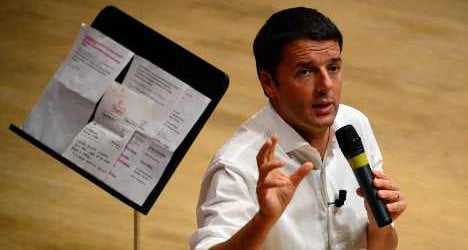Matteo Renzi, at 39 the country's youngest ever prime minister, has vowed to radically overhaul the way Italy is governed and drag its stagnant economy out of the longest recession since the Second World War.
In the most high-profile element of an ambitious action plan outlined on Wednesday he has promised to put €1,000 per year back into the pockets of Italy's poorest families via tax cuts worth a total of €10 billion.
Critics have questioned whether the measure will deliver the hoped-for kickstart to growth and whether Italy can afford it, infuriating the relentlessly upbeat new premier.
"Those who [criticize] do not have the slightest idea of what it means to earn €1,500 a month and to not be able to buy a book for your children, or to be unable to go out even once a week for a pizza," Renzi fumed in an interview with Thursday's Corriere della Sera.
The outburst was illustrative of the populist tone Renzi has struck as he seeks to build support for his change agenda by targeting a pampered Rome-based elite he sees as having leeched the life out of the country.
As well as the tax cuts, Wednesday's reform package included a move to auction off hundreds of "auto blus" – the state-funded cars allocated to senior officials that have become a hated symbol of a bloated, self-serving bureaucracy.
Announcing plans to effectively abolish the upper house Senate in its current form, Renzi noted drily that it would take 315 generous salaries off the government payroll.
Renzi said ten million people earning less than €25,000 a year would benefit from the tax cut.
He also announced a ten percent reduction in a payroll tax paid by bigger companies, a €3.5 billion programme of investment in renovating school buildings and a new guarantee scheme to give smaller businesses easier access to credit.
In perhaps the most significant element of the package, €68 billion worth of bills that various state institutions have not paid to their suppliers will be paid by July, Renzi said.
The measures are to be financed partly by spending cuts and a hike in capital gains tax, but Renzi has ruled out income tax rises for wealthier citizens.
Senate reform the key
The raft of economic measures has been accompanied by initiatives aimed at ending the chronic political instability and legislative stalemates that are blamed for Italy's apparent inability to address problems like corruption in public life, organised crime and the country's crumbling infrastructure.
The Chamber of Deputies on Wednesday passed a bill that, if approved by the Senate, will mean the most successful parties in elections will automatically secure the parliamentary majority they need to govern effectively.
Renzi has also pledged to table proposals to end the Senate's extensive powers to block or delay legislation by the end of this month.
Under his plan, senators will be replaced by representatives drawn from Italy's regions and the upper house will become an essentially consultative body.
Many believe reform of the Senate will be the test by which Renzi's government stands or falls, and he has admitted as much.
"If we don't succeed in this constitutional reform, I will consider not only my time in government, but my political career to be over," he said.
The former mayor of Florence's Achilles heel is that he does not have a direct mandate for everything he is trying to do, having come to power through an internal party coup against former premier Enrico Letta.
Don't miss a story about Italy – Join us on Facebook and Twitter.


 Please whitelist us to continue reading.
Please whitelist us to continue reading.
Member comments